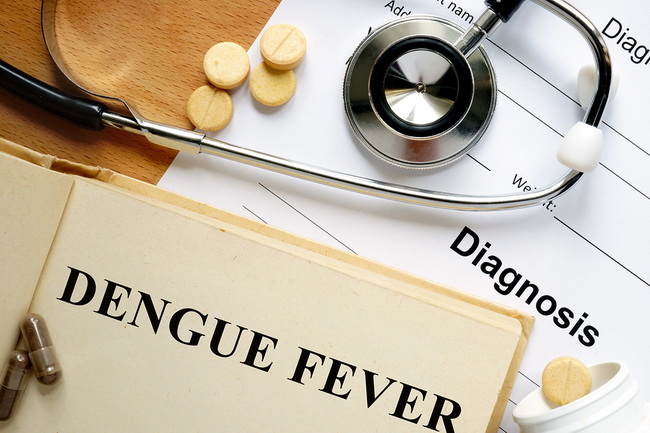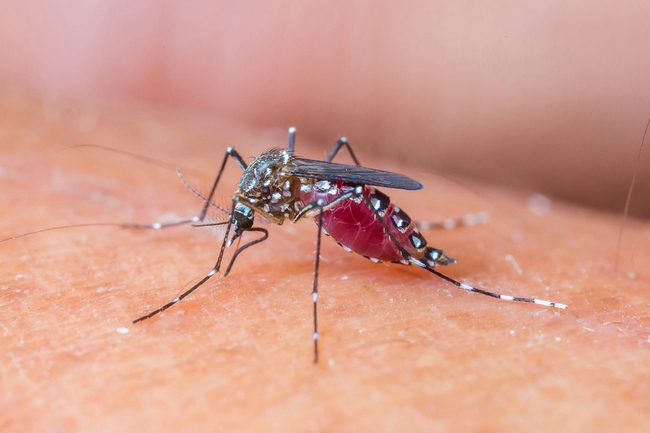- Make It Yourself Lavender Heart-Shaped Bath Bombs!
- 20 Things You Never Knew About “Down There”
- 12 Best Foods For Those Suffering From Arthritis Pain
- 12 Personal Hygiene Mistakes Almost Everyone Makes (Mom Never Told You About #4!)
- 15 Medicinal Plants And Herbs From The Cherokee People
- 12 Mind-Blowing Benefits Of Drinking Coconut Water During Pregnancy
- 12 Outstanding Winter Foods That Won’t Fatten You Up Like A Christmas Turkey
Best Ways To Prevent And Treat Dengue Fever (You Might Have It And Not Know It!)

Photo credit: bigstock.com
Dengue fever, sometimes called breakbone fever, is a viral infection spread by mosquitoes. Although it is a virus, it cannot be spread by human to human contact, only through mosquito bites.
This disease is caused by one of 4 closely related viruses. Dengue is related to yellow fever and West Nile virus. It can affect anyone but for children and infants, this disease can be deadly.
Unfortunately, there is no cure and very little treatment. There is a vaccine in the works, however and if you plan on traveling to the high risk countries of Mexico, Central America, Sub-Saharan Africa, China, Taiwan, Southeast Asia, the Philippine islands, Taiwan or the Pacific Islands, including Hawaii, you might want to ask your doctor if a vaccine has been approved yet.
Many people think that dengue fever does not apply to them because it has been mainly found in tropical locations, but this virus has been spreading like wildfire throughout most of the world. There have been cases in Florida, Texas, Arizona, and California. In 2010, there have also been cases of dengue fever reported in Portugal, France, Brazil, Fiji and Croatia.
The number of dengue cases is vastly underreported because many people believe that they have the flu. One recent estimate, according to the World Health Organization, is that there are about 390 million infections in 128 countries. Consider that in 1970 there were only about 9 countries reporting dengue cases, it’s easy to see how this virus has spread dramatically.
Although it rarely causes death, this does happen in infants and children. Anytime a fever of 104 degrees occurs along with swollen glands, a rash, joint pain, severe headache, pain behind the eyes, vomiting, nausea, or any combination of two or more of these symptoms occur along with the fever, dengue should be suspected. Inspect the body for mosquito bites.
There is a potentially deadly complication to dengue, often called severe dengue, which occurs due to leaking plasma, fluid accumulation, and respiratory distress. This will usually occur within 3 to 7 days after the initial fever. Persistent vomiting along with a drop in the fever to 100 degrees is cause for alarm and the patient should be brought to an emergency room immediately for treatment.
How can you avoid this disease and treat symptoms? Keep reading; we will give you all the info you need to protect you and your family.
Continue to Page 2

Photo credit: bigstock.com
1. Remove Standing Water
Since mosquitoes breed in standing water, the first step is to remove standing water in and around your house as much as possible. Look for water that hides in places like garbage pail lids, unused, uncovered garbage cans, flower pots, empty planters, large water bowls for pets, clogged rain gutters, even inside the leaves of some plants, such as bromeliad, which have funnel shaped leaves that hold water inside, any place where water sits still can hold mosquito larva. Remove any standing water. In the instance of things like kiddie pools, dump them each night when the kids have finished playing. Bird baths can be treated with a few drops of bleach to kill the larva or you can run a hose and spritz out the water every other day to ensure that there is no larva.
2. Eat Antiviral Foods
To protect yourself from becoming infected, you can eat foods and herbs that have known antiviral compounds. Some of the best antiviral herbs are oregano, astragalus root, olive leaf, cat’s claw, mullein, elderberry, licorice root, and lemon balm. If you are pregnant or if you are taking any kind of prescription medication, you should speak with your doctor before you consume any herbal supplement. Ginger and garlic should be used liberally in your cooking or drink several cups of ginger tea. Green tea is also another terrific antiviral. Two or more cups a day can offer you some protection.
3. Use Mosquito Repellents and Traps
If you enjoy being out in the garden, you might try planting some mosquito repellent plants such as lemongrass, garlic, lemon eucalyptus, and citronella. Although mosquitoes are especially active at dawn and dusk, they can come out anytime, day or night, which is why you need to apply a good mosquito repellent on all exposed skin. Make your own by mixing some witch hazel with a few drops of essential oils such as eucalyptus, peppermint, lemon, lemongrass, lavender, or citronella. Apply liberally and often.
You can also try high-tech gadgets such as electronic bug zappers, ultrasonic mosquito repellents, and electronic devices that attract mosquitoes, then suck them up like a vacuum into a small container that they cannot escape from. Make your own traps by putting some yeast, brown sugar, and a bit of water in a two liter plastic bottle with the top cut off and then inverted into the bottom half. This mixture will emit carbon dioxide (which is how mosquitoes find us!) attracting the mosquitoes, then they crawl inside the bottle but can’t find their way out. Be sure to replace the mixture every 10 to 14 days so that it works at top efficiency.
Continue to Page 3

Photo credit: bigstock.com
4. Stay Hydrated
A well-hydrated body is much less likely to come down sick. Also, since our blood cells are made up of both protein and water, drinking plenty of water each day will prevent a low platelet count, which is a common symptom of dengue. Be sure to drink plenty of water, herbal teas, lemon water, vegetable juice, and bone broth to keep your body super healthy through super hydration.
5. Use Screens or Air Conditioning
If possible, use air conditioning to not only stop mosquitoes from entering your home (since you will keep the doors and windows closed) but also because mosquitoes need a warm environment to thrive. If you don’t have or can’t use air conditioning, be certain that all doors and windows have screens to prevent mosquitoes from entering your home. If you live in an area where mosquitoes are a problem, use a mosquito net around all the beds in the home to prevent being bitten while you sleep. Inspect all screens on a regular basis and repair tears or holes quickly.
6. Basil Leaves
Anytime you feel you might be at risk for dengue fever, such as finding a mosquito bite or after visiting a high risk area, reduce your risk of developing this virus by consuming basil leaves. Basil leaves have immune boosting compounds that can prevent you from becoming infected. You can chew on fresh, tender basil leaves (which are also terrific for bringing down high temperatures) or make basil tea by simmering a handful of leaves in 2 cups of water over a low heat for about 20 minutes. Cool and then strain. Drink two cups each day.
7. Wear Protective Clothing
Sometimes the simplest methods are the best. Wearing protective clothing that covers your skin as much as possible such as long sleeved shirts, long pants, or wearing mosquito repellent clothing can go a long way towards avoiding being bitten. Wear light colored clothing because dark colors such as navy blue or black attract mosquitoes. Most insects, including mosquitoes, see dark colors more easily so simply wearing lighter colors can help you avoid these biting insects. Although sandals might be comfortable, you should consider wearing socks with them around or closed shoes such as tennis shoes.
Continue to Page 4

Photo credit: bigstock.com
8. Guppies
If you have bodies of water around your home, such as large fountains or man-made ponds where draining the water is difficult or impossible, you can still avoid mosquitoes from laying their eggs there by adding guppies. Guppies are small, freshwater fish that eat mosquito eggs and larva, so they naturally control the mosquito population. Guppies are very inexpensive and don’t mind cold water. Put guppies in the largest part of your fountain and be sure to block the pump inlet so that they don’t get sucked into it. Guppies are a pretty addition to any pond!
SEE ALSO: 12 Ways to Use Every Day Baking Soda as Medicine
9. Avoid High Activity Times
The types of mosquitoes that tend to carry dengue fever are more active during the day than night and most mosquitoes are more active at dawn, dusk, and the early evening hours. Avoiding being outside during these active times can go a long way towards reducing your risk of being bitten. Always use mosquito nets around children’s beds and use them even for short naps. Children are especially vulnerable to dengue fever and its deadly complications. Stay inside during high activity times and encourage children to play indoors during these hours.
10. Travel Smart
If you plan a vacation to high risk areas, you would be wise to take steps to limit your exposure to mosquitoes. Stay in hotel rooms or resorts that have air conditioning. If this isn’t possible, be sure the room has screens that fit tightly and that are intact. You might want to consider taking a plug in device that attracts and sucks up mosquitoes like a vacuum. If there is no air conditioning, ask if your hotel supplies nets for the beds. Burn a citronella candle in your room. Avoid being outside during times of high activity and wear protective, long sleeved clothing as much as possible. Always use mosquito repellents on exposed skin.
Keep the symptoms of dengue fever in mind so that if you are bitten by a mosquito, you can get proper medical attention. Common symptoms are:
- Sudden high fever of 104 or more
- Severe headache
- Pain behind the eyes
- Vomiting
- Rash, usually appearing two to five days after the fever begins
- Nausea
- Intense muscle and/or joint pain
- Mild bleeding from the gums or nose
These symptoms usually begin somewhere between 4 to 6 days after you are bitten and can last for up to 10 days. If you or your children develop a sudden high fever with vomiting and any other symptoms on this list, see a doctor immediately.
References:





























